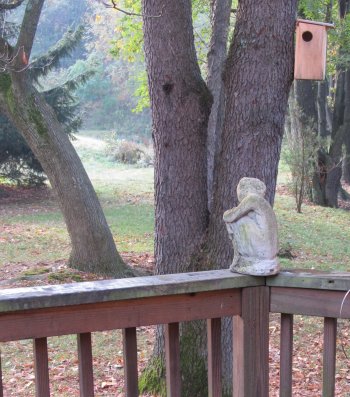October 24, 2010
Sunday
At some point the world’s beauty becomes enough. You don’t need to photograph, paint, or even remember it. It is enough. No record needs to be kept of it, and you don’t need to share it with anyone. When that happens — that letting go — you let go because you can.
                          — Toni Morrison, b. 1931
American fiction writer
from Tar Baby
I don’t know Toni Morrison’s work well. She is more someone whose work I know a lot about rather than someone whose work I actually know. I know about her because of her importance in American letters, but although her novels Beloved and The Bluest Eye are on my neatly-alphabetized fiction shelves at home, I have not read either of them, although I think I started Beloved.
I came upon the quotation from Tar Baby while looking for another thought by Morrison, about infatuation. Someone had posted it on her Facebook page, but it didn’t quite make sense, and so I looked for it, and discovered that the poster had added a word that did indeed mangle the meaning. The thought about not needing to record the world’s beauty was next in line on the Toni Morrison page of some collection of quotations.
That’s the danger of quotations collected from the Internet. They get repeated in altered versions that then proliferate and become the most common way the idea is rendered, or they get posted without context, and you can’t determine what might have been meant. Is it a character in Tar Baby who speaks this? What has happened that the speaker can “let go” of the need to share the beauty of the world? Why is this letting go a good thing?
If it is a good thing, I’m not there yet, and I’m not sure I want to be. Yesterday I drove 375 miles from my place near the river in central Pennsylvania to Rutland, Vermont, two hours south of the place near a different river where I will spend the next month in serious, steady engagement with four short stories that need to be taken to the next level. (That’s workshop-speak for “this story doesn’t suck completely, but neither is it very different from a million other stories.”)
When I left I was experiencing the usual anxiety about all the things at home I have left undone, about an unfamiliar social situation, about my ability to make those “workshoppy” stories any more than what they already are. And I was sick, coming down with a cold, wanting to do almost anything besides drive for eight hours.
I took the route north along I-81, past the exit for my mother’s home town, past Wilkes-Barre, onto Route 84 and then the New York Thruway. I thought that the foliage in northern Pennsylvania would be past its peak of color, and if it was, then I probably would not be able to stand the beauty of its fullness. The scarlets and golds and yellow-greens seemed unusually intense. Somewhere before I crossed into New york, I stopped and took an aspirin and some Zi-Cam and looked at the leaves and the light for a while. At Albany I got off the Thruway for the last portion of Interstate travel before the more rural Fort Ann-Whitehall portion.
I’ve driven this trip so often now that I no longer actually need a GPS to get me there. But I keep it on because it tells me just how many more hours I’ll be stuck in the suspended animation that is a long drive. I had Ian and Sylvia to keep me company, singing about four strong winds and walkin’ away my blues, and when their beautiful harmonies were interrupted by the authoritative voice of my navigator directing me to get off at Troy instead of Fort Ann, I obeyed.
Thus I found myself driving through un-Gallivanted territory, much of it offering the very things that engage fiction writers. I stopped at a convenience store for gas and became enchanted by the graffiti, all of it good-natured and positive, in the bathroom there – people on their way to family reunions, encouragement for local sports teams, and a note from Cara, who “stopped here after falling in love for one day with a boy she will never see again.” Not far from there I saw a strip motel with a house on the hill above that looked very much like the domain of Norman Bates. A phone conversation with a friend was dropped twice, and after the second interruption I passed my first “Moose Crossing” sign. By the time I rolled into Rutland everything about my attitude had changed, and I was ready for the Next Big Thing.
 Last week Ron gave a sealing treatment to our back deck. He picked up the statue I call my Thinking Woman and placed her on the railing, facing away from me. Yesterday morning that seemed like an important symbol.
Last week Ron gave a sealing treatment to our back deck. He picked up the statue I call my Thinking Woman and placed her on the railing, facing away from me. Yesterday morning that seemed like an important symbol.
I’m leaving a place I love at a season I love. I will miss the familiar, but I have to keep looking outward, moving forward.
Come with me as I go. I still need to record, to photograph, to share the beauty of this world. Thank you for reading, so much, so often.
Love it? Hate it? Just want to say hi?
margaretdeangelis [at] gmail [dot] com (replace the bracketed parts with @ and a period) OR
Follow me on Twitter: http://twitter.com/silkentent